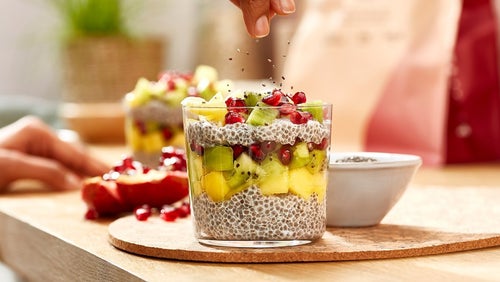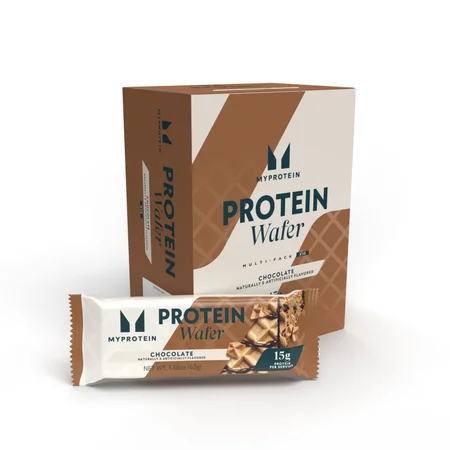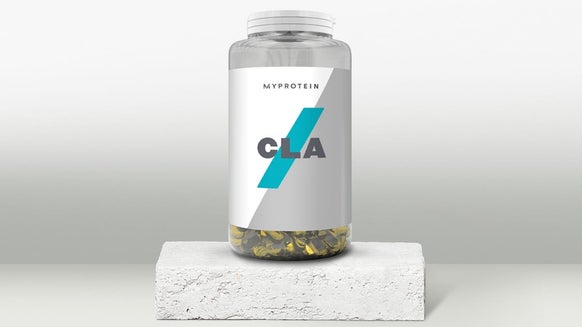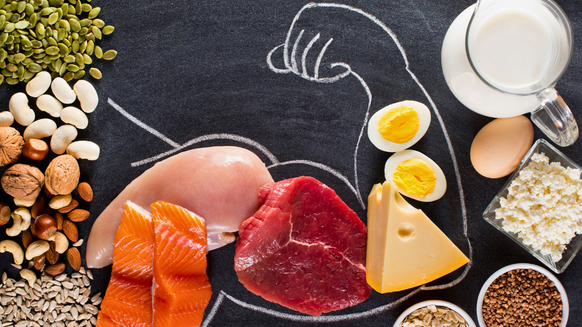Simple Carbohydrates vs Complex Carbohydrates

Carbohydrates are one of the three essential macronutrients, alongside protein and fats, that our bodies rely on to function. They serve as the body's primary energy source, particularly for the brain, which prefers carbohydrates as its fuel of choice.1
But not all carbohydrates are the same. They range from simple sugars to complex carbohydrates, each impacting the body differently. So, it’s important to know the difference between biscuits and brown rice.
Let’s explore everything you need to know about carbohydrates, from their functions to the best sources for sustained energy.
- What Are Carbohydrates?
- What Are Simple Carbohydrates?
- What Are Complex Carbohydrates?
- The Glycaemic Index (GI)
- Do You Need Carbs to Build Muscle?
- Best Carbohydrates for Muscle Growth
- How Many Carbs Do You Carbohydrates?
- Supplements to Help Increase Your Carb Intake
- Benefits of Carbohydrate Supplementation
What Are Carbohydrates?
Carbohydrates are made up of chains of sugar molecules that are broken down by the body into glucose to fuel cells, muscles, and the brain.2 They are found in a wide variety of foods, including fruits, vegetables, grains, and dairy. For adults, carbohydrates should make up 45% to 65% of our daily diet.3
Nutrient-dense sources of carbohydrates like whole grains, legumes, and vegetables offer important health benefits by providing a sustained release of energy, fiber, and essential vitamins and minerals.
At the most basic level, carbohydrates can be classified into simple carbohydrates (sugars) and complex carbohydrates (starches and fiber). Each type has a different effect on digestion and blood sugar levels.
What Are Simple Carbohydrates?
Simple carbohydrates are quick-digesting sugars consisting of one or two sugar molecules, such as glucose and fructose. They provide a fast burst of energy and cause a rapid rise in blood sugar.3
Foods containing simple carbohydrates include:
- Fruits (eg apples, bananas, grapes)
- Dairy products (e.g milk, yogurt)
- Processed and refined sugars (eg granulated sugar, honey, syrup, sweets, soft drinks)
- White bread and pastries (made from refined flour, which has had fiber removed)
While it’s wise to be mindful of simple carbohydrate intake, natural sources like fruit and dairy offer essential nutrients, including vitamins, minerals, and antioxidants. The real concern lies in excessive consumption of refined sugars, which provide little nutritional value and may contribute to metabolic issues.4
To maintain steady energy levels, prioritize whole foods, pair simple carbohydrates with protein or fiber, and enjoy refined sugars in moderation as an occasional treat.

What can simple carbohydrates be useful for?
Although often misunderstood, simple carbohydrates can serve valuable functions in the diet, particularly when a rapid energy source is required. Since they are quickly digested and absorbed, they can be useful at certain times:
- Instant energy: Simple carbs provide a fast-acting glucose source, making them beneficial for athletes before or after exercise.
Managing blood sugar: Some people may need quick-digesting sugars to elevate blood sugar levels.5
What Are Complex Carbohydrates?
Complex carbohydrates are long chains of sugar molecules, known as polysaccharides, that take longer to digest. They cause a more gradual increase in blood sugar compared to simple carbohydrates.6
There are two main types of complex carbohydrates:
- Starches: Found in foods like whole grains, legumes, potatoes, and starchy vegetables.
Fiber: Found in fruits, vegetables, whole grains, nuts, and seeds. Fiber can be further divided into categories like soluble fiber (helps with blood glucose and cholesterol levels), insoluble fiber (supports digestion), prebiotics (feeds gut bacteria), and resistant starch (protects gut health).7,8
Benefits of complex carbohydrates
Complex carbohydrates offer long-lasting benefits that support overall health.3 Fiber-rich complex carbs can improve digestion, regulate glucose levels, and reduce the risk of chronic diseases.9
A diet rich in complex carbohydrates also supports gut health by feeding beneficial gut bacteria, aiding digestion, and preventing constipation.
Complex carbohydrates
Good sources of complex carbohydrates include:
- Whole grains (eg oats, brown rice, quinoa)
- Legumes and pulses (eg lentils, chickpeas, kidney beans)
- Starchy vegetables (eg sweet potatoes, butternut squash, carrots)
- Fiber-rich fruits (eg apples, pears, bananas)
- Nuts and seeds (eg flaxseeds, almonds)

The Glycemic Index (GI)
The Glycemic Index ranks how quickly carbohydrate-containing foods raise blood sugar levels.3 Foods are scored on a scale from 0 to 100, with higher values indicating a rapid spike in blood glucose.
- Low GI (55 or less): Slow, steady increase in blood sugar
- Medium GI (56–69): Moderate effect on blood sugar
- High GI (70-100): Rapid rise in blood glucose
Combining high-GI foods with protein, healthy fats, or fiber can further slow glucose absorption, supporting better metabolic health.10
GI scores of common foods11
Bread:
- Low GI: granary, multigrain, rye bread
- Medium GI: wholewheat bread, white and wholewheat pita bread, muffins, English muffins, malt loaf
- High GI: white bread, baguettes
Cereals:
- Low GI: oatmeal, bran flakes
- Medium GI: Shredded Wheat
- High GI: Raisin Bran, Corn Flakes, sugary cereals
Grains and pasta:
- Low GI: pasta, buckwheat, bulgur wheat
- Medium GI: basmati rice, couscous, quinoa
- High GI: brown and white rice, rice cakes, crackers
Potatoes:
- Low GI: sweet potato
- Medium GI: boiled potatoes, new potatoes
- High GI: French fries, instant potato, roasted potato, mashed potato, baked potato
Vegetables and pulses:
- Low GI: peas, lentils, beans, kidney beans, carrots, yam, tomato juice
- Medium GI: beetroot
- High GI: parsnips, fava beans, popcorn
Fruit:
- Low GI: apples, pears, citrus fruits, kiwi, cherries, plums, grapes, dried pear, dried apricots, dried peaches, mango, prunes
- Medium GI: mixed dried fruit, fresh apricot, fruit juice, sultanas, bananas, raisins, dried figs
- High GI: dried dates, melon, jam, marmalade
Dairy:
Low GI: low-fat milk, diet yogurt, ice cream, low-fat custard, unsweetened soy milk
Do You Need Carbs to Build Muscle?
Protein is often the first thing that comes to mind when building muscle, but carbohydrates also play a crucial role, providing energy for workouts and replenishing glycogen stores in the liver and muscles.
Muscle contractions require glucose for high-energy bursts, making carbohydrates essential for optimal performance in activities like sprints or weightlifting.12 Additionally, research suggests that restricting carbohydrates can force the body to use protein for energy, reducing the availability of amino acids needed for muscle growth.13
Best Carbohydrates for Muscle Growth
For muscle gain, focus on:
- Complex carbs (eg oats, brown rice, whole wheat pasta, quinoa) for sustained energy
- Simple carbs (eg bananas, white rice) around workouts for quick energy bursts
How Many Carbs Do You Need Per Day to Build Muscle?
Research is mixed on how many carbs is optimal for muscle growth. One review suggests consuming at least 15g of carbohydrates (with 0.3g/kg protein) within three hours of training, although the evidence is limited.12 For intense workouts of 11 or more sets per muscle group, or multiple intense sessions in one day, up to 1.2g/kg/h may help to refill glycogen stores.12

Ultimate Nutrition Guide for Bodybuilders | Maximize Muscle Growth
It’s about more than just upping calorie intake...
How Does Your Body Use Carbohydrates?
Carbohydrate digestion begins in the mouth, where enzymes start breaking them down. Once in the digestive system, they are further processed and absorbed into the bloodstream as glucose.3 The speed of this process depends on the carbohydrate type:
- Simple carbohydrates: (Eg fruit, sugary snacks) break down quickly, providing a rapid energy boost.
- Complex carbohydrates: (Eg whole grains, legumes) take longer to digest, offering a steady and sustained release of energy.
As blood sugar levels rise, insulin is released to signal cells to absorb glucose for immediate use.3 Any excess glucose is stored in the liver and muscles as glycogen, serving as an energy reserve for when the body needs it, such as between meals or during prolonged exercise.
How long do carbs stay in your body?
The amount of time carbohydrates remain in the body depends on their type and how they are used or stored. Generally, they are digested within 30 minutes to two hours, entering the bloodstream for immediate energy. Excess glucose is stored as glycogen in the liver and muscles, and any surplus beyond energy needs is converted into fat through a process called lipogenesis.
Supplements to Help Increase Your Carb Intake
Maltodextrin
Provides a quick boost of energy. Ideal for use before or after a workout within four hours of exercise.
Cyclic Dextrin
Can be taken pre and post-workout for energy and recovery.
Weight Gainer Blend
A high-calorie blend of carbohydrates and protein, great for muscle growth and maintenance.
THE Energy Gel
A 2:1 maltodextrin-to-fructose ratio designed for fuel training. Use two sachets up to three times daily.
Benefits of Carbohydrate Supplementation
Carbohydrate supplements can be especially helpful for athletes in situations that require rapid energy replenishment. Some key benefits include:
- Exercise performance: Energy gels, sports drinks, and glucose powders provide a quick source of fuel during prolonged or high-intensity workouts.
- Recovery: Replenishing glycogen stores after intense training helps muscle recovery.
For most people, whole-food carbohydrate sources are enough, but supplements can be useful for specific training or recovery needs.
Take Home Message
Carbohydrates are essential for energy, brain function, and overall health. Choosing fiber-rich complex carbs over refined sugars helps maintain steady energy, support gut health, and reduce the risk of disease. If you want to boost your training and overall health, you need to embrace carbs as part of a balanced diet.
FIND MORE HERE:

Ultimate Nutrition Guide for Bodybuilders | Maximize Muscle Growth
It’s about more than just upping calorie intake...

Clean Bulk vs Dirty Bulk: Which Is Better for Muscle Growth?
What will it be?

High-Protein Breakfast Foods
breakfast is the most important meal of the day...

- Berthoud, H.-R., Münzberg, H., Richards, B. K., & Morrison, C. D. (2012). Neural and metabolic regulation of macronutrient intake and selection. Proceedings of the Nutrition Society, 71(3), 390–400. https://doi.org/10.1017/s0029665112000559
- Chandel, N. S. (2021). Carbohydrate Metabolism. Cold Spring Harbor Perspectives in Biology, 13(1), a040568. https://doi.org/10.1101/cshperspect.a040568
- Holesh, J. E., Martin, A., & Aslam, S. (2023, May 12). Physiology, Carbohydrates. Nih.gov; StatPearls Publishing. https://www.ncbi.nlm.nih.gov/books/NBK459280/
- Campos, V., Tappy, L., Bally, L., Sievenpiper, J. L., & Lê, K.-A. (2022). Importance of Carbohydrate Quality: What does it Mean and How to Measure it? The Journal of Nutrition, 152(5). https://doi.org/10.1093/jn/nxac039
- Reynolds, A., & Mitri, J. (2024, April 28). Nutritional Recommendations for Individuals with Diabetes. Nih.gov; MDText.com, Inc. https://www.ncbi.nlm.nih.gov/books/NBK279012/
- Slavin, J., & Carlson, J. (2014). Carbohydrates. Advances in Nutrition, 5(6), 760–761. https://doi.org/10.3945/an.114.006163
- BDA. (2021, April). Fibre. British Dietetic Association. https://www.bda.uk.com/resource/fibre.html
- Ghavami, A., Ziaei, R., Talebi, S., Barghchi, H., Nattagh-Eshtivani, E., Moradi, S., Rahbarinejad, P., Mohammadi, H., Ghasemi-Tehrani, H., Marx, W., & Askari, G. (2023). Soluble Fiber Supplementation and Serum Lipid Profile: A Systematic Review and Dose-Response Meta-Analysis of Randomized Controlled Trials. Advances in Nutrition (Bethesda, Md.), 14(3), 465–474. https://doi.org/10.1016/j.advnut.2023.01.005
- Tu, Z., Yang, J., & Fan, C. (2024). The role of different nutrients in the prevention and treatment of cardiovascular diseases. Frontiers in Immunology, 15. https://doi.org/10.3389/fimmu.2024.1393378
- 10. Giuntini, E. B., Sardá, F. A. H., & de Menezes, E. W. (2022). The Effects of Soluble Dietary Fibers on Glycemic Response: An Overview and Futures Perspectives. Foods, 11(23), 3934. https://doi.org/10.3390/foods11233934
- 11. Food Fact: The Glycaemic (2023, March 7). University Hospitals Sussex NHS Foundation Trust. https://www.uhsussex.nhs.uk/resources/food-fact-the-glycaemic-index/
- 12. Henselmans, M., Bjørnsen, T., Hedderman, R., & Vårvik, F. T. (2022). The Effect of Carbohydrate Intake on Strength and Resistance Training Performance: a Systematic Review. Nutrients, 14(4), 856.
- 13. Margolis, L. M., & Pasiakos, S. M. (2023). Low carbohydrate availability impairs hypertrophy and anaerobic performance. Current Opinion in Clinical Nutrition & Metabolic Care, Publish Ahead of Print. https://doi.org/10.1097/mco.0000000000000934#










